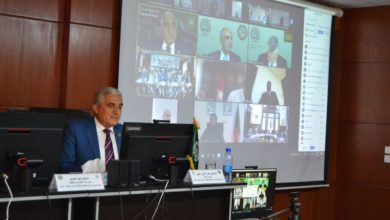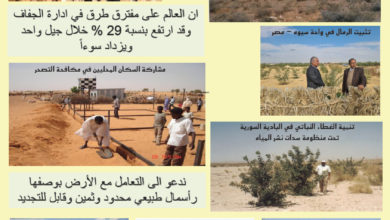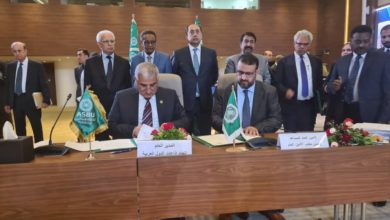Director-General of ACSAD participates in a seminar on the role and importance of Arab institutions in maintaining Arab food security during crises
The Director-General of the Arab Center for Studies of Arid ZONES and Dryland (ACSAD) Dr. Nasr Eddin Al-Obeid presented a working paper in the proceedings of a special seminar on “the role and importance of Arab institutions in maintaining Arab food security during crises.
The seminar was held on 6/7/2020, through the Conference technologies, and was organized by the Union of Arab Agricultural Engineers and the Moroccan Agricultural Engineers Association.
Representatives of the Arab Authority for Agricultural Investment and Development, the International Center for Agricultural Research in Dry Areas (ICARDA), the Arab Chambers Union, and Dr. Akef Al-Zuabi, former Jordanian Minister of Agriculture as a guest of honor, participated in the seminar.
In his paper the Director-General of ACSAD said that the presence of The Arab Center for Studies of Arid Zones and Dryland (ACSAD), as one of the Arab joint action organizations, contributes within its strategic goals and areas of work in solving crises related to agricultural development in general, raising the level of work and making intensive efforts in emergency crises in particular, Within this framework, we have made tangible achievements in raising the rates of crop productivity efficiency and important results in the development of production and productivity of basic agricultural crops in the Arab region. The identification of several species and types of promising pastoral plants suitable for the cultivation of degraded pastures in arid and semi-arid regions and have taken upon the responsibility for implementing several successful projects in the Arab countries to rehabilitate pastures and develop the capabilities of Arab technical cadres.
He noted that” ACSAD” is working to implement its most important goals in the application of desertification control technologies, sand drift, developing policies and procedures to combat desertification and land degradation, mitigate the effects of drought and keep pace with global developments.
Dr. Al-Obaid pointed out that in the field of livestock, the Arab Center of “ACSAD” has worked to implemented many studies, researches and development projects in the field of genetic improvement of sheep and goats, and to increase the rates of milk, meat and wool production, thereby reducing the production gap in this field. We have put all the results of the research and studies at the disposal of the Arab countries.
He added that within the framework of the missions assigned to “ACSAD” and through its annual strategy and plans, it worked on the carrying out many important studies, researches and development projects in most Arab countries, and contributed to the achievement of the Arab water security strategy and its implementation plan, the projects of harvesting rainwater and establishment of Water dams. The development of integrated water resources management plans by advanced scientific methods and the localization of various modern technologies, in addition to the important project “raising irrigation efficiency in the Arab countries”, which can be a real contribution and benefit from promoting practices and preserving water resources.
He noted that in the previous months we worked very flexibly to implement our plans, programs, and activities and to mitigate the effects of the epidemic outbreak crisis, as the (ACSAD) organization continued its work by continuing to carry out administrative and scientific work without interruption, and in constant contact with the relevant ministries, bodies and centers, and the General Secretariat of the League of Arab States. And the preparation of the necessary technical and administrative reports.
As well as The commitment to carry out activities, especially those related to scientific research experiments, ACSAD researchers have continued their research and laboratory and field experiments without interruption, taking the necessary measures to prevent them from the pandemic.
h.e. Director-General said that, In the area of humanitarian action, the Arab Center has intensified its work on livelihood improvement projects and emergency support provided to the people affected by the crisis in the Syrian Arab Republic (Headquarters), and since the advent of the Coronavirus pandemic in February 2020, The project is aimed at providing agricultural assistance to 5,565 rural families in six of Syrian governorates for poor families that do not have sufficient agricultural holdings to grow field crops, including a basket for each targeted family that includes some agricultural equipment, balanced fertilizer, 6 types of winter vegetable seeds and, summer hybrid seeds and high-productivity.
Also, providing a set of tools for growing vegetables on rooftops for households without agricultural land, and a drip irrigation network with all its supplies to irrigate 500 square meters of vegetables that will save 70% of the irrigation water used in the traditional method.to establishing, 350 micro-projects for 350 rural women in the field of milk and dairy products, manufacturing and preserving vegetables and fruits, by providing them with manufacturing and raw materials, training beneficiaries, and upgrading their production and marketing capabilities.
In the field of animal production, 3600 livestock breeders were targeted in seven Syrian governorates, where 840 tons of high-quality compound fodder (capsule) were provided in terms of containing crude protein, salt, and vitamins, 240 tons of barley fodder for the poor farmer in Al Hasakah governorate, by 300 kg for each family, which can meet the needs of their animals for three months
He also pointed that The Arab Center ACSAD, in cooperation with the Spanish organization Action Against Hunger, was currently drafting a relief project that includes the distribution of 7,000 food and health baskets to poor rural families in Aleppo governorate that were directly affected by the Coronavirus.
Dr. Al-Obaid made many recommendations, which could an incentive to the development and improvement of the agricultural sector in the areas of ACSAD`s work and other counterparts, where it has been demonstrated beyond doubt that human beings, studies, and scientific research require greater efforts and additional support, as they generate intellectual, scientific and ideological diversities, which are the source of creativity and innovation.
Dr. Al-Obaid pointed out that, for humanitarian reasons and social risks to human beings, sanctions should be lifted on Arab countries to improve the situation of the COVID-19 confrontation, because the continued imposition of onerous economic sanctions on some countries severely undermines the fundamental right to gain food under the presence of this epidemic. The United Nations has stressed that “if the international community is serious about combating COVID-19 and eliminating food and nutritional insecurity, States should at all times refrain from direct and indirect intervention in the food supply.
Finally, Director-General of the Arab Center (ACSAD) concluded his paper by saying ”ACSAD” continues to carry out its missions, implement its plans, provide its expertise and utilize its capabilities, in coordination and consultation with the Arab Agriculture Ministers, and cooperate with Arab, regional and international organizations, to support the Arab agricultural development process.




